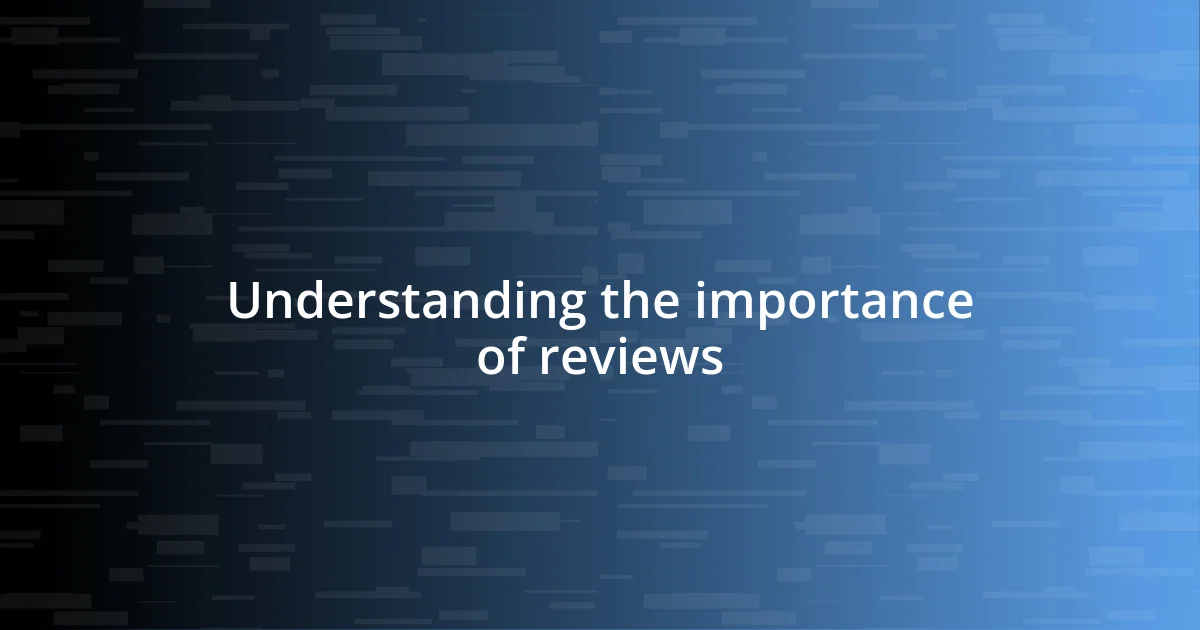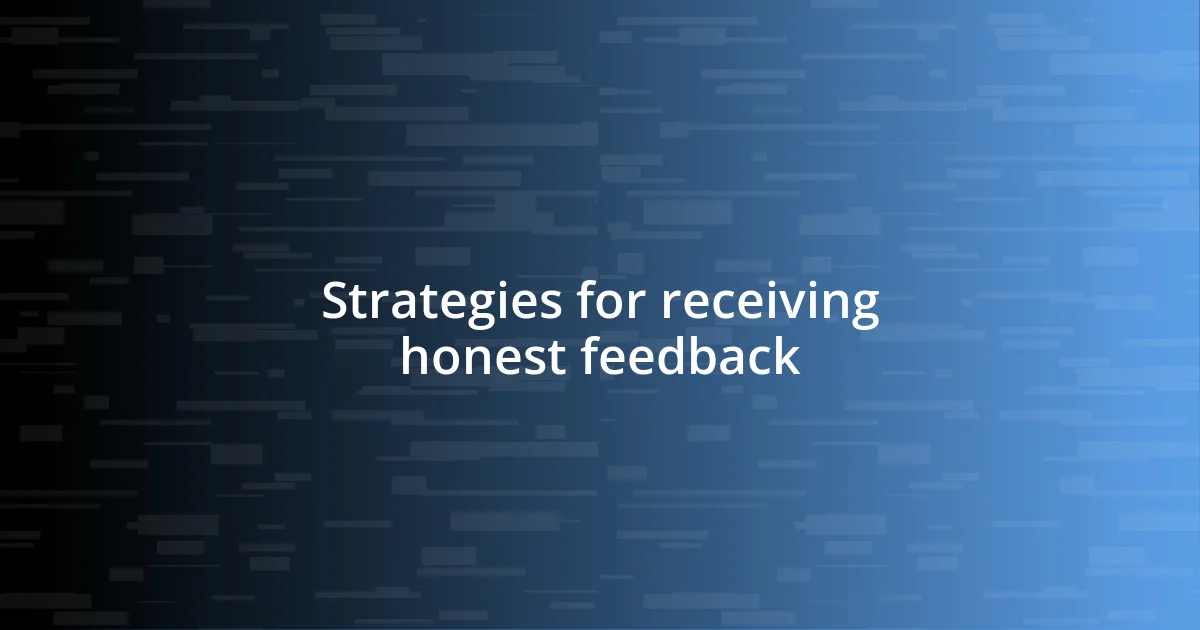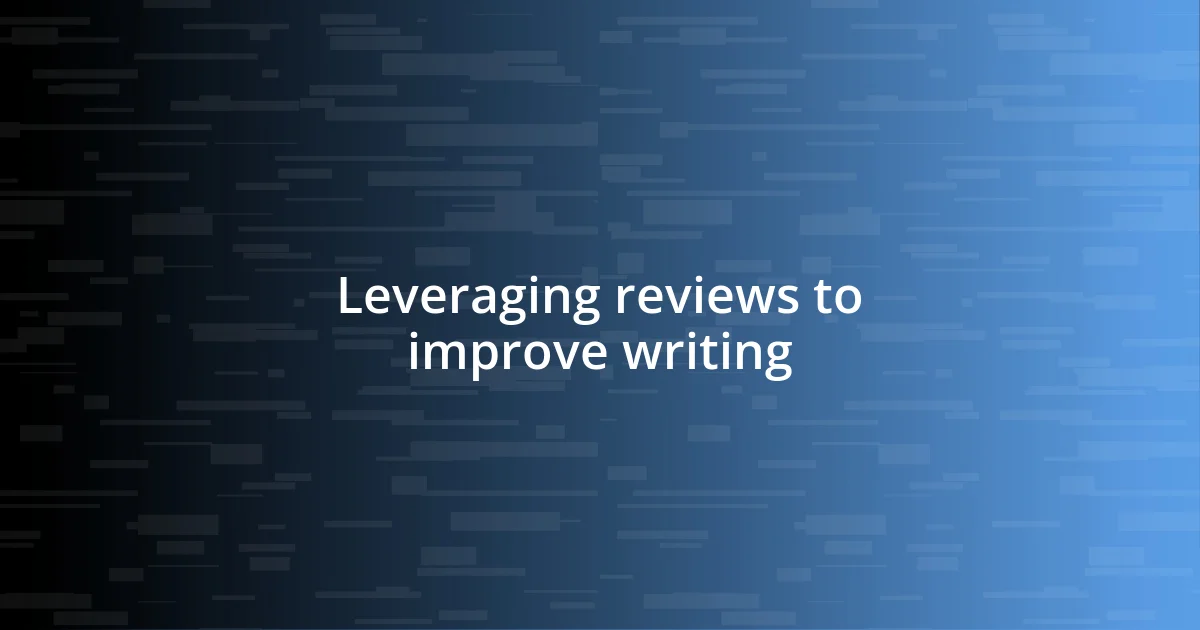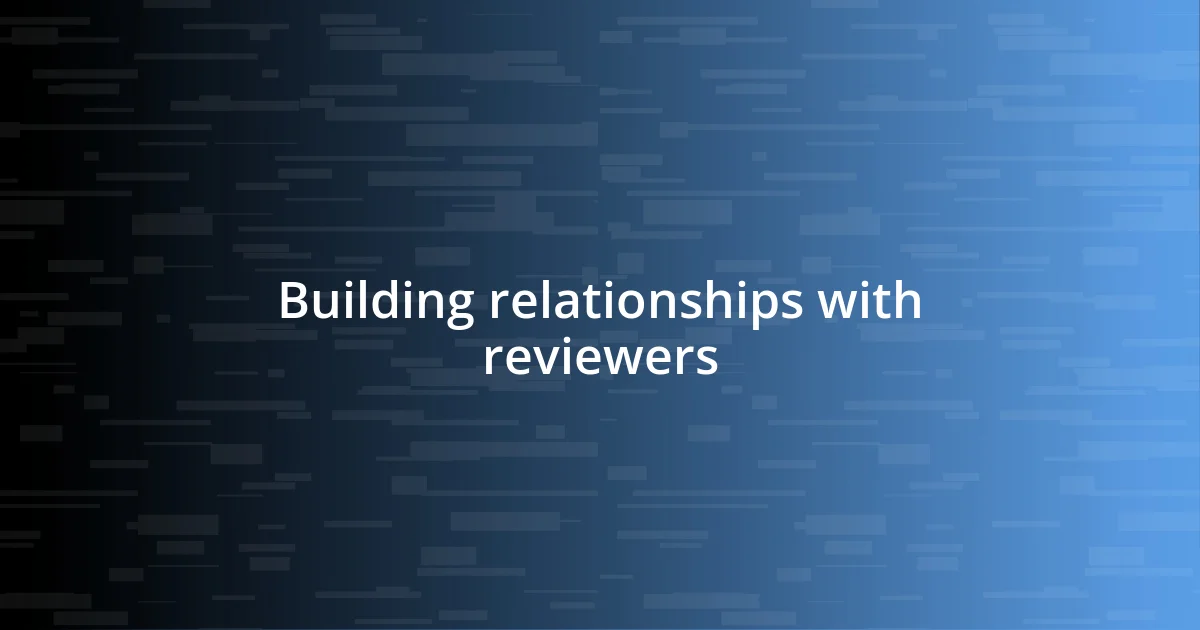Key takeaways:
- Reviews shape a book’s success, offering valuable feedback that connects authors with readers and creates a community around the work.
- Implementing strategies for receiving honest feedback, such as building trust and encouraging specific critiques, enhances a writer’s growth and improves their writing.
- Leveraging reviews for marketing, by showcasing positive feedback and engaging with reviewers, builds credibility and fosters a loyal readership.

Understanding the importance of reviews
Reviews can significantly shape a book’s journey in the literary world, acting as a bridge between the author and the reader. I remember when my debut novel hit the shelves; I eagerly awaited feedback, knowing that reviews would make or break its reception. This anticipation was a mix of excitement and fear—how would my words resonate with others?
When readers share their thoughts, they provide invaluable insights that influence not only potential buyers but also us as writers. Have you ever come across a book that you almost skipped, only to change your mind after a passionate review? Those personal endorsements can amplify interest, turning shadows of doubt into eager anticipation.
Moreover, reviews create a community around the book, inviting discussions and deeper connections. For instance, when someone highlights a character’s emotional struggle and shares their own similar experience, it reminds me why I write in the first place: to connect, to share, and to explore the human experience together. Isn’t it fascinating how one person’s perspective can open the door to countless conversations?

Strategies for receiving honest feedback
To receive honest feedback, I’ve found that creating a safe space for open dialogue is essential. When I invite beta readers to critique my work, I emphasize that I value their candid opinions, no matter how harsh they may seem. This approach not only encourages them to be straightforward but also puts me in a mindset that embraces constructive criticism. The moments when I sat down with writers at workshops, eagerly listening to their thoughts on my draft, were some of the most enlightening experiences for my growth.
Here are some effective strategies I’ve used:
- Build Trust: Share your vulnerability by discussing your writing journey. This can help readers feel more comfortable being honest.
- Ask Specific Questions: Instead of asking, “What do you think?” frame questions like, “Did the story flow well?” or “Was there any part that confused you?”
- Anonymous Feedback: Consider using anonymous surveys to gather raw opinions. Sometimes, people shy away from expressing their true feelings in person.
- Follow-Up Conversations: After receiving initial feedback, I often schedule a follow-up chat. It allows me to dig deeper into their thoughts and clarifies any points that might have been overlooked.
- Express Gratitude: Showing appreciation for their time and insights makes readers feel valued and more willing to share honestly in the future.

Leveraging reviews to improve writing
I truly believe that diving into reviews can be an eye-opening experience. They often unveil patterns I might not see while immersed in my own writing. For example, after reviewing feedback from a series of critiques, I noticed that multiple readers pointed out pacing issues in my latest manuscript. This was a game-changer. Instead of glossing over their observations, I embraced them. I spent days reworking the manuscript, tightening the narrative until it flowed seamlessly. The result? A more engaging story that resonated with my readers in ways I hadn’t expected.
In my journey, I’ve learned to treat reviews as a treasure map. They guide me toward my strengths and weaknesses as a writer. I remember one particularly glowing review that highlighted my character development. That praise gave me a confidence boost to delve deeper into my characters’ psyche in subsequent works. On the flip side, when a review pointed out my dialogue seemed stilted, it motivated me to reevaluate how I portrayed conversations. It’s absolutely fascinating how this kind of feedback can reshape our writing approach and even our style.
To effectively incorporate these insights, I often create a comparison table to analyze feedback trends. This allows me to visualize areas needing improvement alongside my strengths. Below is a simple structure I use:
| Strengths Identified | Areas for Improvement |
|---|---|
| Pacing | Dialogue Naturalness |
| Character Development | Plot Clarity |
| Emotional Depth | Conflict Resolution |
By laying it all out, I can focus my revisions more effectively and understand my writing’s overall impact. This process underscores just how vital leveraging reviews can be for any writer eager to grow and connect more powerfully with their audience.

Building relationships with reviewers
Developing relationships with reviewers can feel a bit daunting, but in my experience, it’s one of the most rewarding aspects of the writing journey. Think about it—when you share a piece of your heart through your work, having someone who truly understands and resonates with it is invaluable. I remember reaching out to a book blogger after they reviewed my debut novel; their insights changed my perspective on my characters profoundly, and we’ve since built a friendship that enriches my writing life.
Engagement goes beyond just asking for reviews; it’s about nurturing those connections. I like to follow up with reviewers by sending personal notes of thanks or even sharing updates on how their feedback influenced my current projects. I find that this not only strengthens our bond but also creates a supportive network where both parties can flourish. It’s amazing how a simple acknowledgment can encourage a reviewer to continue engaging with my future work. Have you ever considered how these interactions could transform your creative community?
I also believe that showing genuine interest in their opinions fosters a deeper connection. Once, during a book launch, I had the chance to chat with a critic who praised a specific plot twist in my story. Their enthusiasm inspired me to think about future works differently. Imagine the possibilities that bloom when you engage actively with those who take the time to review your work! In my eyes, these relationships are not just professional; they become a source of inspiration and motivation, ultimately enriching both my writing and their experience as readers.

Utilizing reviews for marketing
Utilizing reviews as a marketing tool has transformed how I approach my reader outreach. When a thoughtful review pops up, I don’t just celebrate it; I capitalize on it. For instance, after receiving a review that spotlighted themes of resilience in my novel, I used it as a key quote on my social media platforms. It not only drew in potential readers but also reinforced the message I wanted to share about the importance of perseverance. Have you ever thought about how a single well-written review could serve as a beacon to others seeking something inspiring?
Additionally, I’ve discovered the power of showcasing reviews on my website and in promotional materials. When I highlight authentic reader feedback, it builds credibility. I recall an instance when I featured a review that compared my writing to that of bestselling authors. It not only flattered me but also intrigued potential readers who might have otherwise overlooked my work. Think about it—when others see that your book resonates on such a level, doesn’t it create a compelling reason for them to pick it up?
Moreover, I often engage with reviewers on platforms like Goodreads and Amazon. Responding to their insights creates a sense of community. I remember replying to a reviewer who offered constructive criticism. Later, I noticed they updated their review after seeing how their feedback influenced my subsequent writing. This back-and-forth not only strengthens my relationship with individual readers but also sets a positive example for others. How could those interactions elevate your book’s visibility and foster a loyal readership?














